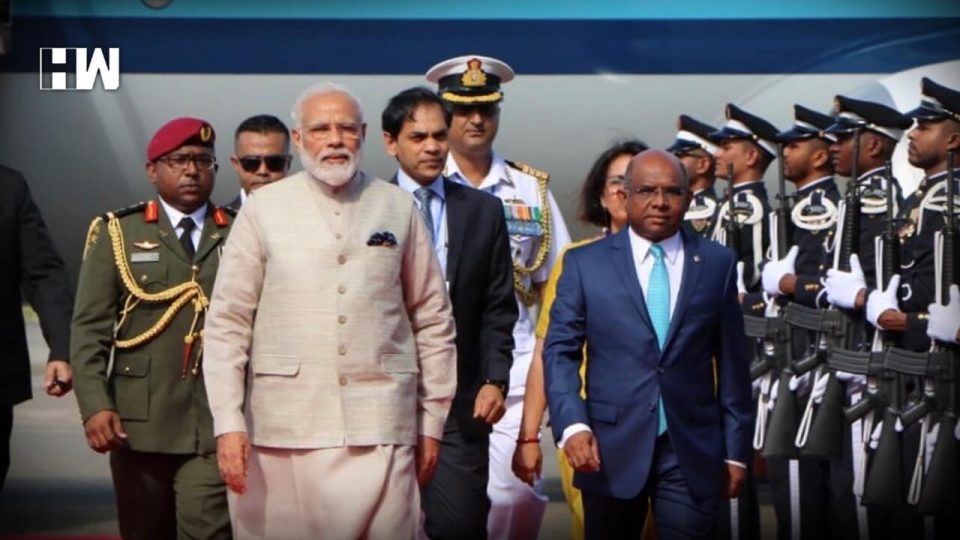Male | Narendra Modi arrived in the Maldives on Saturday on his first foreign visit after re-election as Prime Minister to strengthen the bilateral ties, reflecting the importance India attaches to its ‘Neighbourhood First’ policy.
Modi was received at Male airport by Foreign Minister Abdulla Shahid. “Friendship forever! PM @narendramodi arrives in Male, capital of Maldives to a warm reception by Foreign Minister Abdulla Shahid. PM was last here for President (Ibrahim Mohamed) Solih’s inauguration ceremony in November 2018,” External Affairs Ministry spokesperson Raveesh Kumar said on Twitter.
While Modi visited the Maldives in November 2018 to attend President Solih’s swearing-in, this visit is the first by an Indian prime minister at a bilateral level in eight years.
The two-day state visit of Prime Minister Modi is aimed at further cementing ties with the Indian Ocean archipelago. President Solih and Modi exchanged pleasantries upon the prime minister’s arrival at Republic Square where he was accorded a ceremonial welcome. The prime minister also inspected the guard of honour.
Foreign Minister Shahid said in a tweet that it was a great honour to receive Modi at Velana International Airport on his first state visit overseas. “No doubt, this will be a momentous visit that would elevate Maldives-India relationship to new heights,” he said.
During his visit, Prime Minister Modi will be conferred with the Maldives’ highest honour “Rule of Nishan Izzuddeen”. “The Most Honourable Order of the Distinguished Rule of Nishan Izzuddeen” is the Maldives’ highest honour accorded to foreign dignitaries, Shahid said on Twitter.
Upon his arrival, Modi said on Twitter: “Reached the Republic of Maldives. This visit indicates the importance India attaches to strong ties with the Republic of Maldives and the desire to boost cooperation in various spheres”.
Prime Minister Modi Friday said his visit to the Maldives reflects the importance India attaches to its ‘Neighbourhood First’ policy. Modi said India considers the country as a valued partner with whom it shares deep bonds of history and culture.
During the visit, the prime minister will address the Maldivian Parliament, the Majlis, an indication of India’s important position in the neighbourhood. He is expected to meet the top leadership of the Maldives to strengthen the relationship at the highest level.
To assist the Maldives in its development and revival of its economy, a slew of MoUs are expected to be signed including budgetary support for development projects, extending the Line of Credit for projects like water supply and sewerage, high impact community development projects, customs and white shipping, official sources said.
To consolidate people-to-people relations, Modi’s latest emphasis is on cricket diplomacy in the island nation, helping the mission of President Solih to develop cricket, they said.
Giving a push to enhance connectivity, India is planning to start a ferry service from Kochi to the Maldives, the sources said.
The two leaders will jointly inaugurate two defence related projects a coastal surveillance radar system and composite training centre for Maldives National Defence Forces (MNDF), strengthening defence ties, they said.
Modi is also expected to hold separate discussions with Foreign Minister Shahid and former President Maumoon Abdul Gayoom.
His visit demonstrates the priority that India attaches to the SAGAR (Security and Growth for All in the Region) doctrine, the sources added.
The relations between India and the Maldives deteriorated after the then President Abdulla Yameen imposed emergency on February 5 last year.
Some decisions by Yameen including imposition of restrictions on work visas for Indians and signing of a new Free Trade Agreement with Beijing also did not go down well with New Delhi. However, ties were back on track under Solih’s presidency.
China views the Maldives as key to its Maritime Silk Road project in the Indian Ocean as it has already acquired Hambantota port in Sri Lanka and Djibouti in the Horn of Africa.
As an independent media platform, we do not take advertisements from governments and corporate houses. It is you, our readers, who have supported us on our journey to do honest and unbiased journalism. Please contribute, so that we can continue to do the same in future.

